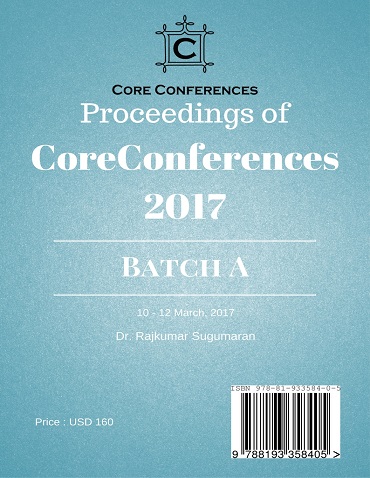- Publication Meta:Value
- Short Title:CC Batch A 2017
- Publisher:ASDF, India
- ISBN 13:978-81-933584-0-5
- ISBN 10:81-933584-0-6
- Language:English
- Type:Hard Bound - Printed Book
- Copyrights:CC Batch A Organizers/ DCRC, London, UK
- Editor-in-Chief:Dr A Senthilkumar
- Conference Dates:10 - 12, March 2017
- Venue Country:Crowne Plaza Changi Airport, Singapore
- Submitted Papers:589
- Acceptance Rate:8.12%
- Website:www.coreconferences.com
Welcome to ASDF Electronic Digital Library!
CoreConferences 2017
CoreConferences 2017
International Conference on Language Teaching and Religious Studies 2017
Paper 003
The Contemporary Understanding of Language and Meaning in Wittgenstein's Philosophy
I Udaya Kumar1, G M Susmitha2
1Associate Professor, Centre for Mahayana Buddhist Studies
2Post-Doctoral Fellow, Department of English, Acharya Nagarjuna University, Nagarjuna Nagar, Guntur, India
Abstract
Ludwig Wittgenstein (1889 - 1951) was considered one of the 20th Century's most important philosophers. He was an Austrian-British philosopher who worked primarily in logic, the philosophy of mind, and the philosophy of language. Wittgenstein's Tractatus is regarded as a significant philosophical work of the twentieth century which identifies the relationship between language and reality. It is an attempt to state in a general way the essence of all languages and the essence of the relation between language and reality. He is not at all concerned with the language of daily life and its connections with the empirical world. His focal attention is on the underlying essence of language which has been covered by its superficial appearances. Essence therefore, is the logical structure of language. It is evident that search for something essential and search for something ideal are not different but same. For Wittgenstein, language is a practical human activity - a form of social practice. The paper focuses to show language and meaning through language-game. Language practiced in different contexts, such as, story-telling, translating, quarrelling, advising, ordering and so on are different from one another and none is identical with mere description. Explanations of one practice of language overlooking a whole host of other uses make our approach to language grossly one sided and highly unrealistic and artificial. To consider that language has only one use seems to be a myth if we look at the various uses of language. Language performs innumerable functions which cannot be accommodated into one category of any kind.
Keywords
Author's Profile
Author profile can be generated and linked through our partners World Book of Researchers. To include your profile online Click Here. After it is approved, please email to edlib @ asdf.res.in to create a link with all the papers.
e-AID
CoreConferences.2017.003
Cite this Article as Follows
I Udaya Kumar, G M Susmitha. The Contemporary Understanding of Language and Meaning in Wittgenstein's Philosophy. International Conference on Language Teaching and Religious Studies (2017): 02. Print.
© 2010 - by EDLIB .
All Rights Reserved.

